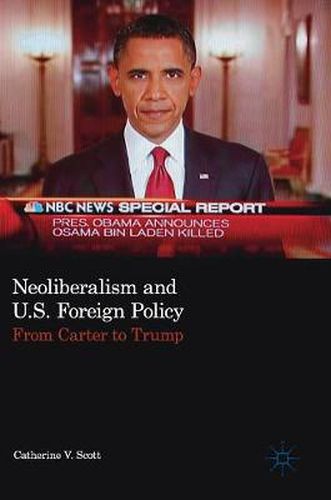Readings Newsletter
Become a Readings Member to make your shopping experience even easier.
Sign in or sign up for free!
You’re not far away from qualifying for FREE standard shipping within Australia
You’ve qualified for FREE standard shipping within Australia
The cart is loading…






This title is printed to order. This book may have been self-published. If so, we cannot guarantee the quality of the content. In the main most books will have gone through the editing process however some may not. We therefore suggest that you be aware of this before ordering this book. If in doubt check either the author or publisher’s details as we are unable to accept any returns unless they are faulty. Please contact us if you have any questions.
While there has been a flood of scholarly efforts to extend, adapt, and revise Foucault’s exploration of the emergence and operations of neoliberalism, the study of foreign policy has remained steeped in the analysis of partisanship, institutions, policies, and personality and their influence on various issue areas, toward particular countries, or specific presidential doctrines. This book brings the political rationality of neoliberalism to bear on U.S. foreign policy in two distinct ways. First, it challenges, complicates, and revises the numerous interpretations of U.S. nationalism that posit a homologous relationship between 1898 and contemporary nationalism, instead arguing that alterations in the operations of capitalism and its correlative forms of governance have produced a differently formatted nationalism, which in turn has produced different operations of U.S. hegemony in the twenty-first century that markedly depart from earlier eras. Second, this book argues for a new timeline-one that starts with the Carter-Reagan era and the crisis of capitalism-ultimately encouraging us to think beyond particular presidencies, wars, bureaucratic politics, and policies in order to train our sights on how long-term and sustained shifts in the economy and attendant government practices have emerged to produce new myths of exceptionalism that more fully cohere with the neoliberal foundations of the U.S. nation-state.
$9.00 standard shipping within Australia
FREE standard shipping within Australia for orders over $100.00
Express & International shipping calculated at checkout
This title is printed to order. This book may have been self-published. If so, we cannot guarantee the quality of the content. In the main most books will have gone through the editing process however some may not. We therefore suggest that you be aware of this before ordering this book. If in doubt check either the author or publisher’s details as we are unable to accept any returns unless they are faulty. Please contact us if you have any questions.
While there has been a flood of scholarly efforts to extend, adapt, and revise Foucault’s exploration of the emergence and operations of neoliberalism, the study of foreign policy has remained steeped in the analysis of partisanship, institutions, policies, and personality and their influence on various issue areas, toward particular countries, or specific presidential doctrines. This book brings the political rationality of neoliberalism to bear on U.S. foreign policy in two distinct ways. First, it challenges, complicates, and revises the numerous interpretations of U.S. nationalism that posit a homologous relationship between 1898 and contemporary nationalism, instead arguing that alterations in the operations of capitalism and its correlative forms of governance have produced a differently formatted nationalism, which in turn has produced different operations of U.S. hegemony in the twenty-first century that markedly depart from earlier eras. Second, this book argues for a new timeline-one that starts with the Carter-Reagan era and the crisis of capitalism-ultimately encouraging us to think beyond particular presidencies, wars, bureaucratic politics, and policies in order to train our sights on how long-term and sustained shifts in the economy and attendant government practices have emerged to produce new myths of exceptionalism that more fully cohere with the neoliberal foundations of the U.S. nation-state.